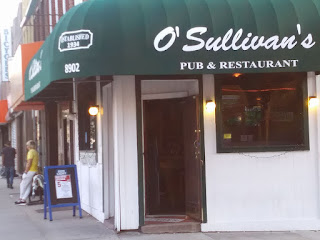Gallantry in Action
A veteran of World War II, my dad fought in Europe with a division known as The Timberwolves, and I’ve been doing some research to find out more about his experiences in the army.
Last week, I Googled the words “James Lenihan + NYC + World War II” and was delighted when I got a hit from a military history website.
I clicked on the link and found James Lenihan, all right, but not the one I was expecting.
This was a James Lenihan who was born in County Kerry, Ireland, in 1846 and who had served with the 5th U.S. Cavalry during the “Indian campaigns.”
Private James Lenihan had been awarded the Congressional Medal of Honor, the nation’s highest military decoration, “for gallantry in action on 2 January 1873, while serving with Company K, 5th U.S. Cavalry, in action at Clear Creek, Arizona Territory.”
I was stunned by this happy internet accident and I’m dying to know more about this man, who spells our family name the proper way with the “i” in the middle—as opposed to those who go with “a’s” or “e’s”.
It is doubtful that we are related as my father’s family came here from County Cork years later and settled in Northeast Pennsylvania. But perhaps our DNA crossed paths somewhere in the distant past.
The website where I found this information is painfully short on details. Private Lenihan survived the battle, and he received his award on April 12, 1875—more than two years after the encounter.
And that’s about it. I’ve been looking online for some background on the Clear Creek incident, but so far nothing.
I did a cursory scan of the New York Times from that era, but news traveled very slowly back then and it’s hard to nail down when—or if—the Times ever covered the battle.
The Black Knights
The battle that Private Lenihan fought in was part of the Apache Wars, a series of conflicts between the U.S. Army and various Apache tribal confederations fought in the southwest between 1849 and 1886, though minor hostilities continued until as late as 1924.
The wars began when American troops erroneously accused Apache leader Cochise and his tribe of kidnapping a young boy during a raid.
The 5th Cavalry Regiment, which was known as “The Black Knights”, traces its origins back to 1855, and its members have included the likes of Robert E. Lee, George Henry Thomas and John Bell Hood.
The regiment served in every major U.S. military action, right up through World War II, the Korean War, Operation Desert Storm and the war in Iraq.
General William Sherman—the man behind Sherman’s March during the Civil War--praised the 5th Cavalry's actions in Arizona, saying that they were "unequaled by that of any Cavalry Regiment".
It amazes me to think of Private Lenihan, who came all the way from Ireland to fight in the deserts of the American West.
He was born during the Potato Famine, also known as the Great Hunger, so it’s hardly surprising that his family pulled up stakes and crossed the Atlantic.
And, of course, the Irish were a large part of the American military back then.
Between 160,000 and 200,000 Irish immigrants and first generation Irish-Americans served in the Civil War, either as volunteers or draftees. Irish-Americans received the Medal of Honor more than any other ethnic group in the war.
I’ve still got plenty of research to do about my father’s time in the army, but I’m going to keep on digging for whatever facts I can find about Private Lenihan.
What exactly he did do during the Clear Creek battle to warrant this most sacred award? Did he becomme a career soldier, or did he muster out of the army and settle somewhere out west?
What did he do for a living? Did he ever get back to Ireland, or did he cut all ties with the old country?
I should mention here that my dad received several medals for his service, as well, including the Purple Heart and the Bronze Star, but he tended to downplay military awards.
“I didn’t go in much for medals,” he once told me. “The thing I’m most proud of is my intact ass.”
When you think of all the horrible things that happen in war, coming home in one piece is a great achievement indeed.
And to both these men I say, thank you for your service.





Comments
I'm intrigued by Elias Tracy. I wonder what his story was. Keep digging!